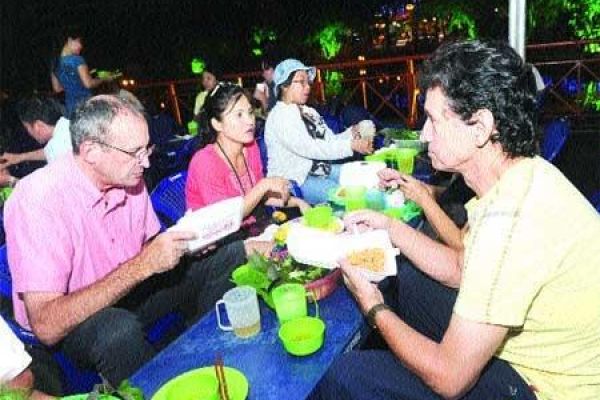
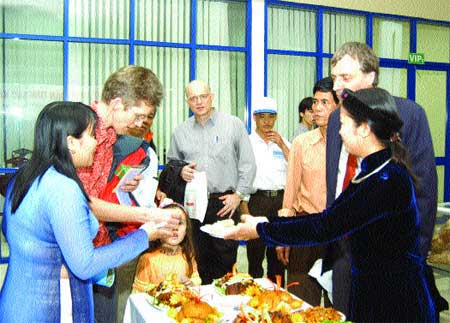 Food frenzy: Some travel companies in Ha Noi have started to
Food frenzy: Some travel companies in Ha Noi have started to
organise culinary tours for international visitors, but more needs to be done.
Like many tourists who travel to Hanoi, Sue Slatter was first drawn by the city's formidable reputation for food.
Though the cooking teacher from California admits there were other factors, she says it was the chance to get knee-deep in street food and discover secrets of the increasingly-popular Vietnamese cuisine that led her on a pilgrimage to the home of pho.
"I had been told that we would have to queue up for the very best pho," she says outside a bustling Ha Noi street joint. "So now I'm really curious to see if it will be worth the wait."
Twenty minutes later, Slatter was a convert.
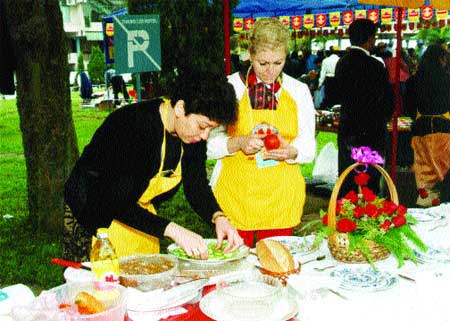
Spoilt for choice: A Vietnamese chef guides a foreign visitor to prepare traditional Vietnamese food during a culinary tour. "I have to concur, Hanoi pho really is delightful. In the United States we also have pho, but its taste is completely different," she said.
"The noodles in the US are too thick, whereas here they are thin and so much more tasty. Hanoi pho is charming and delicious."
David Jackman, a chef from the US who was also in the tourist group, said: "This is my second time eating Vietnamese pho. The noodles are sumptuous and the cook mixed the spices perfectly to give the dish its own unique flavour.
"There's also a good range of condiments on the table so I can adjust the dish to suit my own tastes.
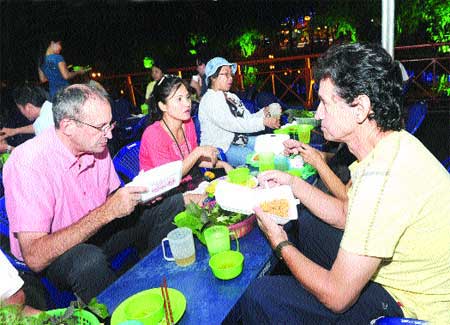 Major attraction: Street food is one of the strongest sectors of Vietnamese tourism.
Major attraction: Street food is one of the strongest sectors of Vietnamese tourism.
"The atmosphere at the restaurant is great and everyone sat close to each other, creating a friendly, communal vibe." After enjoying Vietnam's traditional dish, the tourists visited a noodle workshop in the Old Quarter.
They were very surprised to learn that in the heart of the crowded old town sits a modern processing facility supplying noodles to many of the city's shops.
The workshop owner said: "Many people know the formula for making noodles, but to get them thin and soft requires traditional know-how. In addition, we ensure food safety for consumers eschewing food additives."
A history of migration
Over centuries of practice, perfecting Hanoi cuisine has become somewhat of an art form. According to culinary expert Nguyen Phuong Hai, who has made efforts to revive the city's traditional foods, Hanoian dishes were previously based around home-grown products which were locally sourced.
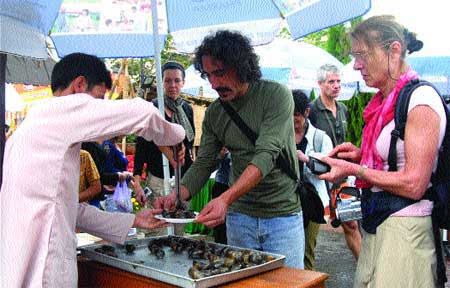
Worth the wait: Tourists enjoy Vietnamese food at a festival held in Hanoi.
"The city also had a history of migration, therefore Hanoi cuisine has always been enriched by food from other regions. That's why the dishes feature a real melange of flavours."
In other regions, each locality has its own traditional dish which is considered a staple. But in Hanoi, eaters can choose from a long list of specialities.
As for pho, the city has many famous shops, each offering their own take on the dish, such as pho Bat Dan, pho Ly Quoc Su and pho Thin.
Along with pho, there is cha ca (fried fish) La Vong, banh cuon (steamed rolled rice pancake) Thanh Tri, com (green rice flakes) Vong, dau phu (tofu) Mo and many others.
Thus, Hanoi culinary enthusiasts not only enjoy the food, but also the experience of shopping for ingredients and cooking.
Nguyen Xuan Quynh, CEO of Vietnam Now Travel company, said: "Depending on the requirements of each tourist group, we will arrange culinary tours exploring the Hanoi market and learning how to cook traditional food.
"As for the groups who are interested in the historical features of Hanoi cuisine, we invite folk artisan Pham Thi Anh Tuyet to take them on an interactive trip through Hang Be market.
"For a number of the more sophisticated tours we let tourists experience travelling through the market by cyclo, introducing them to the old streets where many of these wonderful dishes were born."
From the tourists' perspective, the chance to gain insight from an experienced old hand is an invaluable addition to the tour.
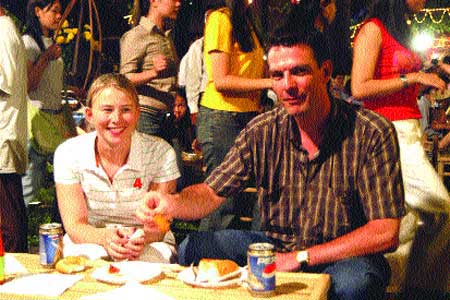 Off the beaten track: Culinary tours aim to create interesting and
Off the beaten track: Culinary tours aim to create interesting and
unusual experiences for foreign visitors.
Made Suryasa, an Indonesian culinary expert, said: "I feel very lucky to learn how to cook from a culinary artisan of Hanoi. What impressed me most was the mixture of the spices, the combination of salty and sweet elements which blend the flavours together.
"It made me fall in love with Hanoi cuisine and I'm going to practice what I've learned here because cooking is a real passion of mine."
For a long time, tour operators have been aware that, in order to attract international tourists, food is a vital part of the package.
Quynh added: "In my opinion, Hanoi cuisine has a strong advantage to exploit, but we need investment and promotion to take full advantage."
From a spiritual perspective, culinary artisan Tuyet believes Vietnamese traditional foods are very balanced in terms of yin and yang.
"International visitors consider Vietnamese food to be beneficial for the health, because it contains less oil and fat than Chinese food, less spicy than Thai and South Korean food, plus more vegetables than European food. Foreign visitors like Vietnamese foods because the dishes are light and digestible. Furthermore, Vietnamese foods use many kinds of attractive vegetables and spices in harmony, leading to fantastic results."
With its strong reputation and wide range of dishes, Hanoi has enough potential to turn its cuisine into a strong brand, attracting foreign tourists.
Vu Hung, a tour guide in Hoan Kiem District, said international visitors love to explore food on Hanoi's pavement.
"They love to try food on the street, because through the food, they can further understand the daily lives of Hanoians. Most tourists express surprise, saying they did not expect the foods would be so delicious and different from the fare at their hotels."
But while the famously chaotic streets make for great pictures, a reorganisation of the chaos could help give the city stronger credentials
Professor Ngo Duc Thinh, director of the Centre for Belief Study and Culture Preservation of Vietnam and author of the book Kham Pha Am Thuc Vietnam (Exploring Vietnam Cuisine), said many countries have food shops on pavements, but organise them well to ensure the shops are clean and welcoming for tourists.
"Hanoi has long been famous for its street food. If we can organise and manage the stalls properly, many Hanoi streets can become clean and tidy eating destinations," he said.
With many food tours already popular, the city must now focus on its marketing to solidify its notoriety.
Nguyen Quoc Ky, general director of Vietravel company, said: "Currently we are still struggling to choose highlights for the Vietnam tourism brand. In my opinion, we should choose cuisine to be the brand name, because the world's leading marketing expert Philip Kotler once suggested, "Vietnam – the world's kitchen".
"Recently, Christina Ha, a Vietnamese-American woman who won the title of Master Chef of America 2012 with traditional Vietnamese dishes, made a real impression on international travellers through Vietnamese cuisine, so we should take advantage of this to promote it further."
Do Thi Hong Xoan, president of the Vietnam Association of Hotels, believes Vietnam's tourism sector should train 1,000 Vietnamese chefs.
"However, to make cuisine become a tourism brand name, we should have strategies, solutions and specific programmes on food culture."
At present, the tourism companies that offer culinary tours say they have to find ways to create these tours.
In Hanoi, there are about 10 restaurants offering cooking tours with prices between US$35-55 per person depending on each programme.
Tourists who have experienced these culinary tours confirmed that the traditional cuisine of Vietnam always made an impression on them, so if they had a chance they would come back to Vietnam again.
Source: VNS



.jpg)
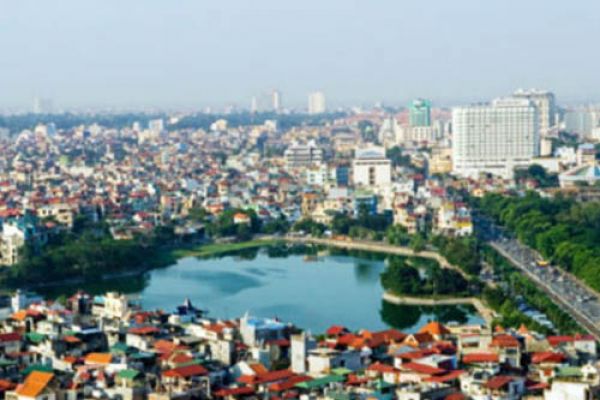


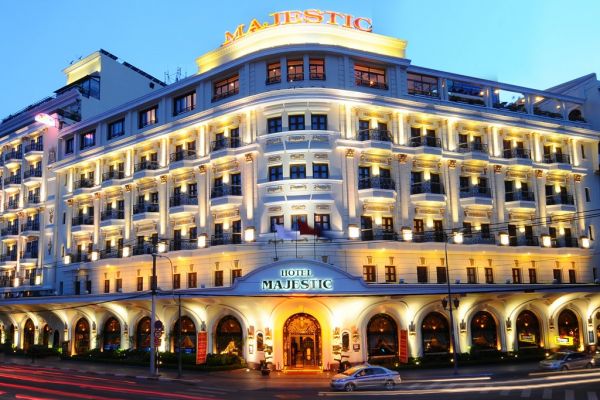

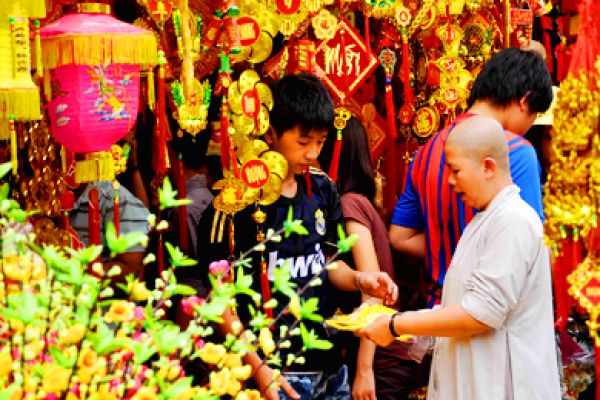
(84-63) 3 826042 – (84-63) 3 511142
No 54 Nguyen Dinh Chieu, Ham Tien Central Mui Ne Beach Binh Thuan Vietnam
523 To Hien Thanh District 10 Ho Chi Minh City Vietnam
Ha Long Halong City Quang Ninh Vietnam
A13 Hung Thong 2 Halong City Quang Ninh Vietnam




